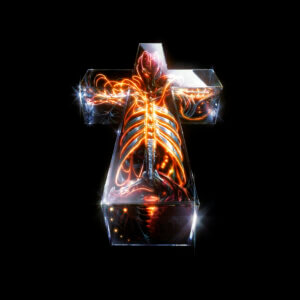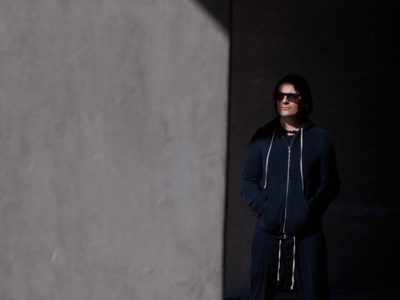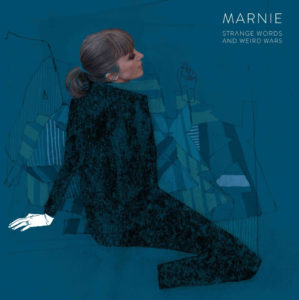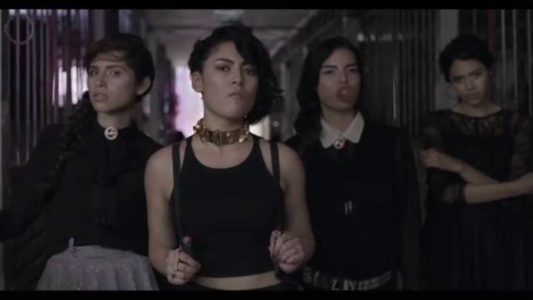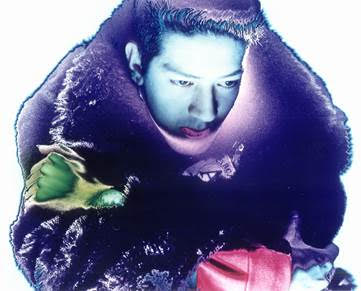Ladytron embraces Sci-fi in “The Island”

Sci-fi, Electronica and the infinite possibilities of both: Exploring Ladytron’s “The Island” and its video with Daniel Hunt and director Bryan M. Ferguson It’s been half a year, but Electronica act Ladytron has most certainly returned to the musical realm. Six months ago saw the release of its first single in seven years “The Animals”, an examination of species carried by heavy Synth effects, curious vocals and, of course, the poppy electronic style emblematic of the band. This week, the collective bestows eager fans with the audio track and accompanying music video for “The Island”. Myriad synths largely comprise its auditory layout, accentuating the disconnection painting by lyrics as haunting as ‘We are Savages’, with both musical elements driving the dystopian narrative of isolationism.
Drawing inspiration from Jonathan Glazer’s cinematic adaptation of Sci-Fi horror Under the Skin, the video – directed by Bryan M. Ferguson – depicts a humanistic alien life force exploring Scottish countryside, and later more urban landscapes, whilst unknowingly being pursued by two men in suits. Our distinctly female protagonist begins her journey by escaping from a glass incubator, before she roams the forest, befriends the startled inhabitant of a stereotypical country house, and then enters a generic city setting, from where she is captured. Her brief narrative concludes with immolation, in the exact same picturesque Scottish landscape she recently observed; her body destroyed in a space typically linked with peace, she is murdered in a space of refuge. Chief vocalist and songwriter of the troupe, Helen Marnie, recently declared that both the song and its video boldly interrogate the regressive stance of leading UK governments, particularly the UK whilst examining the more abstract theme of space, both in an auditory and visual capacity. Disconnection between individuals, place and nature provides the overarching theme for “The Island”. Beth Andralojc from Northern Transmissions caught up with the band’s founding member Daniel Hunt and the music video director to discuss this, along with all the other inspirations behind the single and its visual accompaniment.
Northern Transmisions. In an interview with Paper Magazine, songwriter and vocalist of the group Helen Marnie emphasised the significance of physical space in the overarching theme of the track. Why is space so important?
Danny: I think she was connecting sonic space and physical space lyrically, but the video is something else. Of course once the film is connected to the music many possibilities and new interpretations grow – that might be one of them.
NT: There’s always been a strong link between Sci-fi movies and Electronica music. Obviously, the contemporary style helps to set a futuristic scene – but why else do you think this link exists?
Danny: The semiotics of these machines are burned into us, and have been for decades. There’s probably nothing more to it than the golden age of dystopian science fiction coincided with the availability of these new machines. I try to remember if there was any point in my life that I didn’t associate them with this kind of imagery and theme, I don’t think so. Having said that I’d love to walk out of the forest for the first time and hear those sounds separated from any of those connotations.
NT: What’s the Inspiration behind the video?
Bryan: The inspiration behind the video was the song itself. The concept came together quickly – Helen sent me the demo and I listened to it endlessly while walking around empty industrial spaces and over motorway bridges. I felt the song had a strong melancholic feel to it and that helped shape the tone of the story and
the visuals quickly formed from there.
NT: Did any other Sci-fi movies, or scores, influence the music?
Danny: We all absorbed Vangelis, Wendy Carlos, Philip Glass and so on through movies, but never attempt to deliberately force any sound or influence into a piece of music. I assume that’s how it works for everyone – influences are subconscious, spontaneous and instinctive. That is followed by distortion and juxtaposition and so on.
NT: Has any movie inspired the video?
Bryan: No film in particular inspired the video. I wanted it to be its own thing. Though I did find myself sitting up late at night consuming the video work of Chris Cunningham and Jonathan Glazer – funnily enough when I initially pitched the idea to Helen she mentioned it reminded her of “Under the Skin” which I can definitely see some parallels with.
NT: The video seems to take place in a dystopian society?
Bryan: I wanted to make the video’s setting ambiguous. I wanted to create a sense of place but also restrict from showing many establishing shots to keep it somewhat cryptic. But I’m happy that the video conjures up a sense of dystopia as it’s fitting in today’s present climate.
NT: Who is the boy the main character is meeting? Is that their child?
Bryan: For me this scene is quite a textured one. As mentioned before, the film is deliberately told with room for interpretation. Why that house? Who is The Boy? What is their relationship? Is there in fact a relationship? The Experiment gazes intently at the fish reminiscent of it’s own experiences – a false sense of freedom as they swim within a glass prison.
NT: “The Island”, Helen stated in the aforementioned, in part decries the powerless role that Scotland seems to play in UK politics. Do you believe that as British politics grows more and more insular, musicians are feeling more compelled to tackle social and political injustices through their work?
Danny: I’m not sure, I feel quite disconnected from the UK because I haven’t lived there for some time. I’m still there, politically, but where I do live, in Brazil, recent events have been far more grave – we had an actual coup d’etat, sacking of the country’s resources and so on, and the ghosts of even darker days are lurking. Britain’s left should pay close attention to events in Brazil if it ever wants to actually govern.
NT: Do you believe that musicians speak for their listeners, and therefore have a duty to confront pernicious political and social forces?
Danny: Not for them, and not a duty, but look around, people are compelled to. How we react is different, and I don’t necessarily think that a desire for escapism is coming from a different place than that which triggers confrontation. There are external uncontrollable factors. How do you react to an identical situation at different stage in your life? Then again, what is the purpose of these themes within music? Is there one? They’re autobiographical, I feel they just reflect where we are, not intended to instruct, but there are times when they serve that purpose.
NT: Aside from current political issues, is there a didactic element to the track that applies to any time or place?
Danny: Beneath the more evident theme there’s a story that is personal to Helen. To me, music that I’ve taken something valuable away from has been the result of interpretation. Never from an interview, nor the instruction of the artist. There’s hopefully wisdom in your own interpretation, even if it is wrong.
NT: Both of the titles from your latest LP seem rather literary – “The Island” and “The Animals”, with their definite articles and affirmative tones, could easily be the titles of dystopian novels. Whilst the former suggests an interrogation of place, the latter implies one on species. Were both singles written with the aim of challenging perceptions of identity and belonging?
Danny: I always double take at the phrase ‘dystopian future’, because we are clearly already in one. I’m not sure that challenging those particular perceptions was the aim with either, but it might have been the result. There’s actually another key one on the record, “The Mountain” which was amongst the first we worked on for this album, and is probably closer to what you describe.
NT: The video for “The Island” is concerned primarily with the ‘othering’ and hunting of an uncanny human figure, notably different, yet somewhat similar, to humans, and follows the aforementioned character being gradually dehumanised and eventually terminated.
Danny: This is the director’s concept, inspired by the track, but it resonates in a way that I didn’t envisage when we originally saw the treatment. I showed it to some friends and they looked at me in shock when it finished. I said “what did you expect? a happy ending?”. For me the setting of The Island, the mundaneness of it all, emphasises this banality of evil.
NT: Is the video narrative a comment on how, as nations become more and more insular and detached from other nations, their hostility towards ‘others’ (figures different to them in some way) grows?
Danny: I don’t know if that was within in the director’s vision but it is obviously an issue for all of us. Perhaps ‘The Animals’ deals with this theme more directly.
NT: What’s your response to the previous question, Brian?
Bryan: The film implicitly examines today’s current climate and where we’re headed. It explores the alienation and tyranny that we’re forced to swallow on a daily basis. I wanted to show society’s regressive and intolerant nature and set that within a world that might end up mirroring our own.
NT: As in Jonathan Glazer’s Under the Skin, the Scottish countryside is the predominant setting for the video. What does this landscape mean to you? Danny: That’s Helen’s home, her most familiar place. I don’t know it well, but it pushes some nostalgic buttons. Since I’ve been away I realise that I don’t know the UK anywhere near as much as I thought I did. I return feeling not like a tourist, but not a native either. Does Science lead to savagery? Or is there a broader message about progress? As of today, August 1st, the earth has officially depleted its natural resources for the year.
Bryan: I don’t believe science is savage, human nature however is open for debate. In the film we witness the birth of The Experiment and how it explores new beings and spaces. In the end, when it’s captured and though it can express emotion it is still ultimately destroyed. I guess when you boil it down, the film is a nihilistic look at society’s lack of progress.
NT: Is this part of a sequence/narrative? Is there a follow up video/song?
Bryan: I always saw this as a singular story – the film opens with the birth of The Experiment and is bookended with it’s death. However there is more that could potentially be explored in future films. If that was something the band wanted to do then I’d be open to it.
interview by Beth Andralojc
Latest Reviews
Tracks
Advertisement
Looking for something new to listen to?
Sign up to our all-new newsletter for top-notch reviews, news, videos and playlists.
